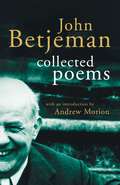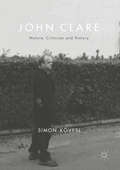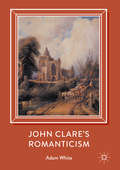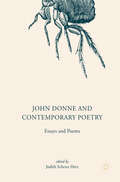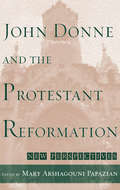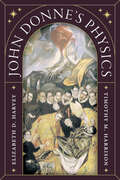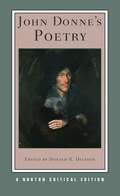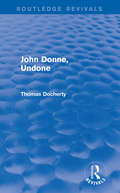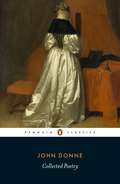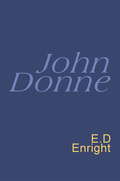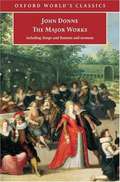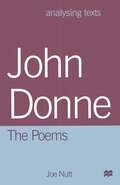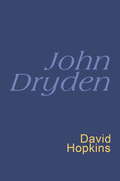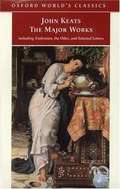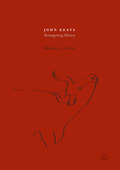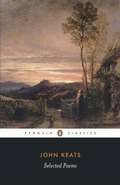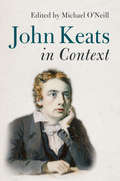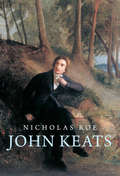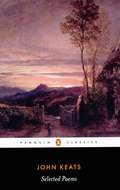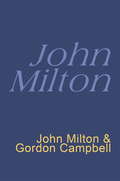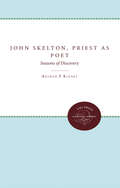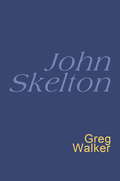- Table View
- List View
John Betjeman Collected Poems
by John BetjemanCollected Poems made publishing history when it first appeared, and has now sold more than two million copies, to an ever-growing readership. This newly expanded edition includes Betjeman's verse autobiography, Summoned by Bells. With a new Introduction by Poet Laureate, Andrew Motion, Collected Poems is the definitive Betjeman companion.
John Clare
by Simon KövesiJohn Clare (1793–1864) has long been recognized as one of England's foremost poets of nature, landscape and rural life. Scholars and general readers alike regard his tremendous creative output as a testament to a probing and powerful intellect. Clare was that rare amalgam ‒ a poet who wrote from a working-class, impoverished background, who was steeped in folk and ballad culture, and who yet, against all social expectations and prejudices, read and wrote himself into a grand literary tradition. All the while he maintained a determined sense of his own commitments to the poor, to natural history and to the local. Through the diverse approaches of ten scholars, this collection shows how Clare's many angles of critical vision illuminate current understandings of environmental ethics, aesthetics, Romantic and Victorian literary history, and the nature of work.
John Clare and Community
by John GoodridgeJohn Clare (1793-1864) is one of the most sensitive poetic observers of the natural world. Born into a rural laboring family, he felt connected to two communities: his native village and the Romantic and earlier poets who inspired him. The first part of this study of Clare and community shows how Clare absorbed and responded to his reading of a selection of poets including Chatterton, Bloomfield, Gray and Keats, revealing just how serious the process of self-education was to his development. The second part shows how he combined this reading with the oral folk-culture he was steeped in, to create an unrivaled poetic record of a rural culture during the period of enclosure, and the painful transition to the modern world. In his lifelong engagement with rural and literary life, Clare understood the limitations as well as the strengths in communities, the pleasures as well as the horrors of isolation.
John Clare's Romanticism
by Adam WhiteThis book offers a major reassessment of John Clare's poetry and his position in the Romantic canon. Alert to Clare's knowledge of the work of his Romantic contemporaries and near contemporaries, it puts forward the first extended series of comparisons of Clare's poetry with texts we now think of as defining the period - in particular poems by Robert Burns, William Wordsworth, Lord Byron, and John Keats. It makes fully evident Clare's original contribution to the aesthetic culture of the age by analysing how he explores a wide range of concerns and preoccupations which are central to, and especially privileged in, Romantic-period poetics, including 'fancy', the sublime, childhood, ruins, joy, 'poesy', and a love lyric marked by a peculiar self-consciousness about sincere expression. At the heart of this book is the claim that the hitherto under-scrutinised subjective stances, transcendent modes, and abstract qualities of Clare's lyric poetry situate him firmly within, and as fundamentally part of, Romanticism, at the same time as his writing constitutes a distinctive contribution to one of the most fascinating eras of English literature.
John Donne and Contemporary Poetry
by Judith Scherer HerzThis collection of poems and essays by both poets and scholars explores how John Donne's writing has entered into the language, the imagination, and the navigation of erotic and spiritual desires and experiences of twentieth- and twenty-first-century writers. The chapters chart a winding path from a description of the Donne and Contemporary Poetry Project at Fordham University to an encounter with the Holy Sonnets to a set of modern holy sonnets and then through the work of a poet who used Donne's Devotions on Emergent Occasions to chart his own dying. There are further poems on sickness and recovery, an essay on Donne and disease that brings in the work of an Australian poet, and several chapters of poems with various Donnean echoes. Of the final four chapters, one places Donne in relation to another poet and one to the Psalms, followed by two chapters on Donne's speech figures and his poetics.
John Donne and the Protestant Reformation: New Perspectives
by Mary Arshagouni PapazianThis collection of thirteen essays by an international group of scholars focuses on the impact of the Protestant Reformation on Donne's life, theology, poetry, and prose.
John Donne's Physics
by Elizabeth D. Harvey Timothy M. HarrisonA reimagining of Devotions upon Emergent Occasions as an original treatment of human life shaped by innovations in seventeenth-century science and medicine. In 1624, poet and preacher John Donne published Devotions upon Emergent Occasions, a book that recorded his near-death experience during a deadly epidemic in London. Four hundred years later, in the aftermath of our own pandemic, Harvey and Harrison show how Devotions crystalizes the power, beauty, and enduring strangeness of Donne’s thinking. Arguing that Donne saw human life in light of emergent ideas in the study of nature (physics) and the study of the body (physick), John Donne’s Physics reveals Devotions as a culminating achievement, a radically new literary form that uses poetic techniques to depict Donne’s encounter with death in a world transformed by new discoveries and knowledge systems.
John Donne's Poetry: Authoritative Texts, Criticism
by John Donne Donald R. DicksonDickson (English, Texas A&M U.) presents texts of Donne's (1572-1631) poems that draw heavily on manuscript sources and are now considered authoritative by scholars. The critical essays are arranged in the same categories as the poems themselves: metaphysical poetry; satires, elegies, and verse letters; songs and sonnets; and holy sonnets and divine poems. A chronology of his life and work is included. Annotation ©2007 Book News, Inc., Portland, OR (booknews.com)
John Donne, Undone (Routledge Revivals)
by Thomas DochertyContemporary criticism of Donne has tended to ignore the historical culture and ideology that conditioned his writings, reinforcing the traditionally accepted model of the poet as a humanist of ethical, cultural and political individualism. In this title, first published in 1986, Thomas Docherty challenges this with a more rigorously theoretical reading of Donne, particularly in relation to the specific culture of the late Renaissance in Europe. Docherty locates Donne’s poetry at the crux of the various scientific, legal, domestic and rhetorical discourses that surrounded and informed it. With a broadly post-structuralist approach, this reissue will benefit literature students with an interest in the wider study and context of John Donne’s work.
John Donne: Collected Poetry
by John DonneRegarded by many as the greatest of the Metaphysical poets, John Donne (1572-1631) was also among the most intriguing figures of the Elizabethan age. A sensualist who composed erotic and playful love poetry in his youth, he was raised a Catholic but later became one of the most admired Protestant preachers of his time. The Collected Poetry reflects this wide diversity, and includes his youthful songs and sonnets, epigrams, elegies, letters, satires, and the profoundly moving Divine Poems composed towards the end of his life. From joyful poems such as 'The Flea', which transforms the image of a louse into something marvellous, to the intimate and intense Holy Sonnets, Donne breathed new vigour into poetry by drawing lucid and often startling metaphors from the world in which he lived. His poems remain among the most passionate, profound and spiritual in the English language.
John Donne: Everyman's Poetry (Everyman's #2 Poetry Ser. #Vol. 33)
by John Donne E. D. EnrightThe best of John Donne's poemsJohn Donne (1572-1631) was born into a Catholic family and studied law before sailing with Essex to attack Cadiz in 1596. He was appointed secretary to Sir Thomas Egerton, the Lord Keeper (later Lord Chancellor), in 1598, but forfeited his worldly prospects when he secretly married Ann More, Lady Egerton's niece, in 1601; he was dismissed by Egerton and briefly imprisoned. The next twelve years or so were passed in poverty, without regular employment. He entered the Church and in 1621 was made Dean of St Paul's, where he became a renowned preacher. His first collection of poems was published posthumously in 1633.
John Donne: The Major Works
by John Donne John CareyThis authoritative edition was formerly published in the acclaimed Oxford Authors series under the general editorship of Frank Kermode. It brings together a unique combination of Donne's poetry and prose - all the major poems, complemented by rarely published letters and extracts from Donne's sermons - to give the essence of his work and thinking. John Donne (1572-1631) is today celebrated as one of the greatest of the metaphysical poets, whose verse was daringly original and whose use of imagery and conceits marked a new, intellectual approach to poetry. His Satires, Elegies, and Songs and Sonnets, which contain his most famous love poems,were complemented by his religious writing, both verse and prose. He was one of the most renowned preachers of his day, and this volume does equal justice to the full range of his work. In addition to nearly all his English poetry this volume includes over 130 extracts from Donne's sermons, as well as the full text of his last sermon, 'Death's Duel'. A distinguishing feature of the selection is that the works are arranged in the chronological order of their composition.
John Donne: The Poems (Analysing Texts)
by Joe NuttJohn Donne's poems are some of the most challenging and stimulating in the English literary heritage. This book looks at the entire range of his poetic output, from the erotic to the divine, from satires to sonnets. Through detailed analysis of a large number of individual poems, Donne's intellectual vitality and unique poetic voice is entertainingly explored. The practical techniques are explained clearly, and when applied to the work of other poets, will enable the reader to feel confident in understanding and discussing even the most demanding verse.
John Dryden: Everyman Poetry
by John DrydenAn elegant and witty writer, poet laureate from 1668, Dryden was on of the major dramatists, critics and poets of his age.
John Dryden: Everyman's Poetry (Everyman's Poetry Ser.)
by John Dryden David HopkinsAn elegant and witty writer, poet laureate from 1668, Dryden was on of the major dramatists, critics and poets of his age.
John Keats
by John Keats Elizabeth CookThis authoritative edition was originally published in the acclaimed Oxford Authors series under the general editorship of Frank Kermode. It brings together a unique combination of Keats's poetry and prose - all the major poems, complemented by a generous selection of Keats's letters - togive the essence of his work and thinking. In his tragically short life Keats wrote an astonishing number of superb poems; his stature as one of the foremost poets of the Romantic movement remains unassailable. This volume contains all the poetry published during his lifetime, including Endymion in its entirety, the Odes, 'Lamia', and bothversions of 'Hyperion'. The poetry is presented in chronological sequence, illustrating the staggering speed with which Keats's work matured. Further insight into his creative process is given by reproducing, in their original form, a number of poems that were published posthumously. Keats's letters are admired almost as much as his poetry and were described by T. S. Eliot as 'certainly the most notable and most important ever written by any English poet'. They provide the best biographical detail available and shed invaluable light on Keats's poems.
John Keats
by William A. UlmerThis book considers Keats's major poems as exercises in Romantic historicism. The poetry's rich allusiveness represents Keats's effort to reclaim the British canon for Cockney revisionism, and reveals Keats characteristically invoking the past to define his contemporary cultural politics. The book begins by discussing Keats's Cockney traditionalism in its Regency context and then proceeds through the poet's career in chronological order. There are chapters on history and vocation in the poet's first volume, the failed idealism of 'Endymion', gender and audience in the Medieval Romances, the 'Ode on a Grecian Urn' in historical context, secularism and consolation in the other great Odes, and then the two 'Hyperion' fragments, in which history ramifies beyond poetic method to become the explicit subject of inquiry. The result is a stimulating reassessment of Keats's intellectual development and most admired poems.
John Keats Selected Poems
by John BarnardOver the course of his short life, John Keats (1795-1821) honed a raw talent into a brilliant poetic maturity. By the end of his brief career, he had written poems of such beauty, imagination and generosity of spirit, that he had - unwittingly - fulfilled his wish that he should 'be among the English poets after my death'. This wide-ranging selection of Keats's poetry contains youthful verse, such as his earliest known poem 'Imitation of Spenser'; poems from his celebrated collection of 1820 - including 'Lamia', 'Isabella', 'The Eve of St Agnes', 'Ode to a Nightingale' and 'Hyperion' - and later celebrated works such as 'La Belle Dame sans Merci'. Also included are many poems considered by Keats to be lesser work, but which illustrate his more earthy, playful side and superb ear for everyday language.
John Keats in Context (Literature in Context)
by Michael O’NeillJohn Keats (1795–1821) continues to delight and challenge readers both within and beyond the academic community through his poems and letters. This volume provides frameworks for enhanced analysis and appreciation of Keats and his work, with each chapter supplying a succinct, informed, and accessible account of a particular topic. Leading scholars examine the life and work of Keats against the backdrop of his influences, contemporaries, and reception, and explore the interaction of poet and world. The essays consider his enduring but ever-altering appeal, engage with critical discussion and debate, and offer revisionary close reading of the poems and letters. Students and specialists will find their knowledge of Keats's life and work enriched by chapters that survey subjects ranging from education, relationships, and religion to art, genre, and film. Covers a vast range of topics, taking a fresh look at the mutual exchange of influence between the poet and his world. Concise and incisive chapters by leading names in the field will appeal to specialists as well as students. Keeps the poems at the forefront of the contextual picture, enabling enhanced analysis and appreciation of Keats's work.
John Keats: A New Life
by Nicholas RoeThis landmark biography of celebrated Romantic poet John Keats explodes entrenched conceptions of him as a delicate, overly sensitive, tragic figure. Instead, Nicholas Roe reveals the real flesh-and-blood poet: a passionate man driven by ambition but prey to doubt, suspicion, and jealousy; sure of his vocation while bitterly resentful of the obstacles that blighted his career; devoured by sexual desire and frustration; and in thrall to alcohol and opium. Through unparalleled original research, Roe arrives at a fascinating reassessment of Keats's entire life, from his early years at Keats's Livery Stables through his harrowing battle with tuberculosis and death at age 25. Zeroing in on crucial turning points, Roe finds in the locations of Keats's poems new keys to the nature of his imaginative quest. Roe is the first biographer to provide a full and fresh account of Keats's childhood in the City of London and how it shaped the would-be poet. The mysterious early death of Keats's father, his mother's too-swift remarriage, living in the shadow of the notorious madhouse Bedlam—all these affected Keats far more than has been previously understood. The author also sheds light on Keats's doomed passion for Fanny Brawne, his circle of brilliant friends, hitherto unknown City relatives, and much more. Filled with revelations and daring to ask new questions, this book now stands as the definitive volume on one of the most beloved poets of the English language.
John Keats: Selected Poems (Macmillan Collector's Library #188)
by John KeatsKeats is one of the major figures in the second generation of Romantic Poets and was considered by Tennyson to be the greatest poet of the nineteenth century. The preoccupying themes of Keats' poetry are love, art, sorrow, the natural world and thenature of the imagination. However, his poetry is often also indirectly critical of conventional political, religious, and sexual beliefs. This collection contains pieces from different periods in his short life, from his earliest verse to his later unpublished poems. It also includes his best-loved works, such as The Eve of St Agnes, Lamia, and the Odes, and extracts from Endymion.
John Milton: Everyman's Poetry (Everyman Poetry Ser. #No. 2)
by John Milton Gordon CampbellBest known for his epic masterpiece Paradise Lost, Milton is also a master of subtle lyric harmony. He is one of the greatest writers of the 17th century, and of all time.
John Skelton, Priest As Poet: Seasons of Discovery
by Arthur F. KinneyKinney shows how the Mass, the Divine Offices, and the liturgy underlie the themes and image clusters of Skelton's poems and argues that liturgical music, especially the plainsong, informs all of Skelton's meters. What emerges is the portrait of a consistent, determined, and imaginative poet in whose canon poetics is grounded in the marriage of teaching and preaching. The study sheds new light on the interrelationships of politics, poetry, and religion in Renaissance England.Originally published in 1987.A UNC Press Enduring Edition -- UNC Press Enduring Editions use the latest in digital technology to make available again books from our distinguished backlist that were previously out of print. These editions are published unaltered from the original, and are presented in affordable paperback formats, bringing readers both historical and cultural value.
John Skelton: Everyman Poetry
by John SkeltonSkelton is probably the greatest unknown poet of English literature. The outspoken tutor of the future Henry VIII, Skelton was an idiosyncratic genius whose poetry defies rules and boundaries.
John Skelton: Everyman's Poetry (Everyman's Poetry Ser.)
by Greg Walker John SkeltonSkelton is probably the greatest unknown poet of English literature. The outspoken tutor of the future Henry VIII, Skelton was an idiosyncratic genius whose poetry defies rules and boundaries.
